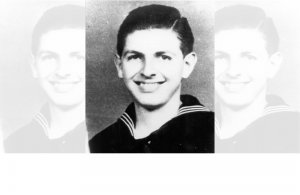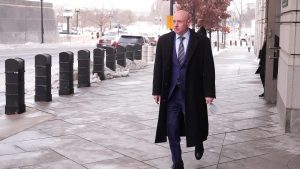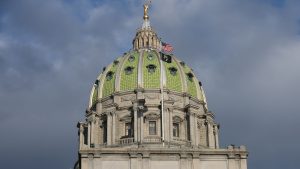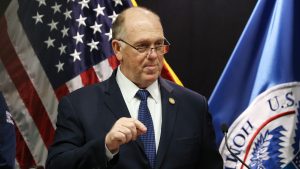Trump takes credit for violent crime drop where rates were already falling
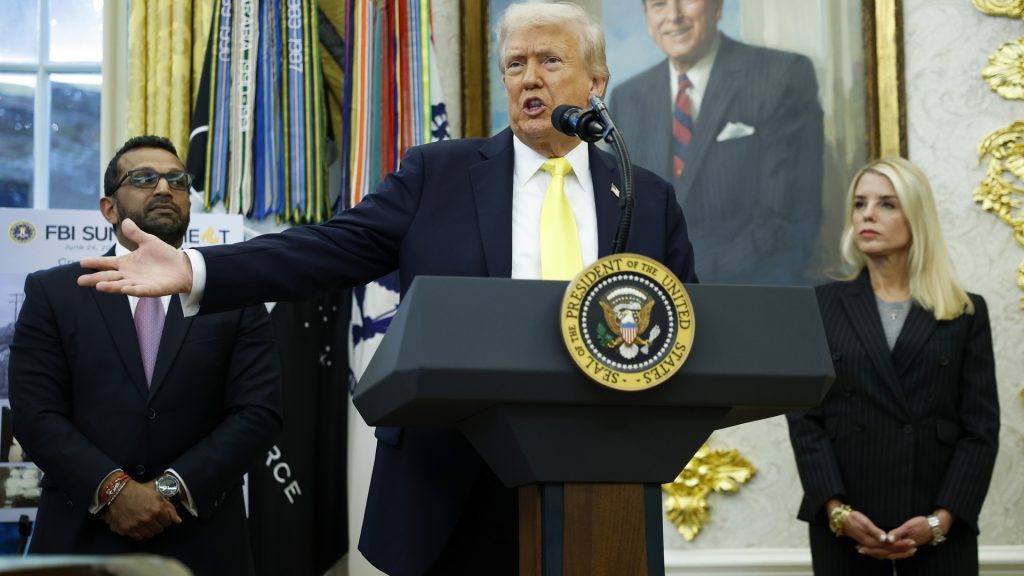
President Donald Trump took credit for a decline in violent crime across the country during a recent press conference. Data shows those numbers were already declining after significant upticks during the COVID-19 pandemic.
Trump’s claims
While speaking to the media and flanked by FBI Director Kash Patel and Attorney General Pam Bondi, Trump touted the success of what he called “Operation Summer Heat.”
The president said that’s the name of the operation to reduce violent crime during the summer months, which typically see increases in violent crime as temperatures rise.
“Over the past few months, FBI offices in all 50 states made crushing violent crime a top enforcement priority,” Trump said. “And that’s what they did, rounding up and arresting thousands of the most violent and dangerous criminals.”
Trump claimed the FBI made 8,000 arrests of violent criminals between June and September. It’s unclear where that number came from.
“I campaigned on crime, but I never thought we’d go into every city and take a really safe city that we’ve all been living with for years and make them safe,” Trump said. “And now it’s like a passion for me.”
While the president claims his administration is responsible for crime reduction, experts pushed back.
“I don’t think there’s any validity to those claims,” James Unnever, retired professor of criminology at the University of South Florida, told Straight Arrow News.
Unnever said the data alone isn’t enough.
“A month or two, when examining rates of crime, have essentially no validity because trends of crime are usually measured in years,” Unnever said.
Crime drops
Despite the president’s rhetoric of rising crime rates in cities like Chicago and Portland, statistics show crime is down both in the short and long term.
Like many other cities, Chicago saw a spike in crime during the COVID-19 pandemic in 2020 and 2021.
“The network of civil society went on vacation, shut down,” Wesley Skogan, professor emeritus at Northwestern University, told Straight Arrow News. “In particular, about kids not being in school, and social services closing and nonprofits closing, and violence interrupters, street workers not being out in the street.”
Skogan added that law enforcement had other priorities during that time.
“At any given time, about a quarter of the police department was off dealing with the risk of the COVID, so all kinds of stuff simply stopped happening,” Skogan said. “The whole mechanism of government to provide services and safety was slowing to a halt.”
As the pandemic faded and society returned to more normal operations, crime came down.
Numbers from early 2025, before Operation Summer Heat, showed a continuing downward trend of homicides, violent crime and more in Chicago.
“Things reopened,” Skogan said. “Funding got reestablished. Police got busy again. People, they could interact safely with people on the street again. The violence interrupters came back out, the nonprofits reopened.”
In the case of Chicago, the violence numbers have been dropping for years except for the spike during the pandemic.
In some areas, there have been historic numbers, with the city recording the fewest number of summer murders since 1965.
It’s similar in other cities Trump has deployed the National Guard, like Memphis, where troops arrived last week.
Despite Trump calling the city “deeply troubled,” crime in Memphis has dropped to 25-year lows across several major categories, including overall crime.
“These historic reductions reflect the dedication and resilience of the men and women of the Memphis Police Department, as well as the strong partnership with our community,” Chief CJ Davis of the Memphis Police Department said. “We remain focused on protecting our neighborhoods and creating a stronger, safer Memphis for all.”
Memphis did have significant room for improvement. FBI data shows the city had the highest violent crime rate in the nation in 2024, at 2,501 violent crimes recorded per 100,000 residents.
Then, there’s Portland, OR, which Trump referred to as “war ravaged.”
Data shows Portland saw a decline in violent crime in the first half of 2025, including a 51% drop in homicides.
“The data is very strong on these trends being multi-city, 18 months to two years in duration and in many places, you’ve been pushing towards record lows or record percentage declines,” Skogan said.
Who’s responsible for declining crime?
“There’s all sorts of different theories in terms of why crime increases and decreases,” Unnever said. “No one is 100% sure. Some argue it could be related to policing, others related to rates of unemployment.”
Skogan added it’s not just Trump that’s trying to take credit for the declining crime numbers across the country after pandemic-induced spikes in violent crime.
“The whole web of society sort of collapsed and then re-expanded again,” Skogan said. “You can imagine how it’s hard to unravel the pieces. And every one of those pieces I described, by the way, is happily taking credit for it.”
When it comes to the president, Skogan said there’s really no reason for him to take credit, even if he’s trying to bring down crime.
“Presidents aren’t in office by the time they could enjoy the fruits of their efforts,” Skogan said.
Unnever agreed.
“Crime has gone up and down during Republican and Democratic presidencies,” Unnever said. “So usually it’s larger, more macro influences that determine these fluctuations in crime.”
Skogan pointed to former President Bill Clinton and the Violent Crime Control and Law Enforcement Act of 1994.
“That’s probably the single most prominent example of an actual targeted policy, which is, hiring more police officers for big cities,” Skogan said.
Otherwise, they both agreed presidential policies typically don’t have large impacts on crime numbers.
“There are potential policies that can mitigate or enhance the level of crime, although not in a really substantial way,” Unnever said.
National Guard deployment
While Trump has deployed troops to cities like Chicago, Memphis and Washington, D.C., those troops have different capabilities than local law enforcement and are not equipped for crime control.
“They don’t have squad cars,” Skogan said. “They don’t have radios that connect them to the 911 center. They don’t have dispatching capacity.”
He said it’s a completely different job than local police officers.
“They’re simply not organized, trained or capable of doing anything except what they’re doing here in Chicago, which is stand guard over federal buildings,” Skogan said.
While the visuals of troops walking through the cities have flooded the news, Unnever said bad actors see them too and just move their operations elsewhere.
He called it the “balloon effect,” where you squeeze one part of the balloon and the air just moves to another part.
“The people that are involved in moving the drugs are smart enough to stop doing what they’re doing or minimizing it, knowing that the policy is only temporary,” Unnever said. “And once the police are pulled back out, it’s back to business as usual.”
He added sending troops to police civilians could have the opposite effect, especially in minority communities that could feel they’re being targeted.
“It would enhance their anger towards the criminal justice system and probably, in all likelihood, increase their probability of acting out consequentially,” Unnever said.
Despite that, Trump maintains that sending in troops is necessary and plans to look at San Francisco next.
“I think we can make San Francisco one of our great cities, 10 years ago, 15 years ago,” Trump said. “And now it’s a mess.”
The post Trump takes credit for violent crime drop where rates were already falling appeared first on Straight Arrow News.


